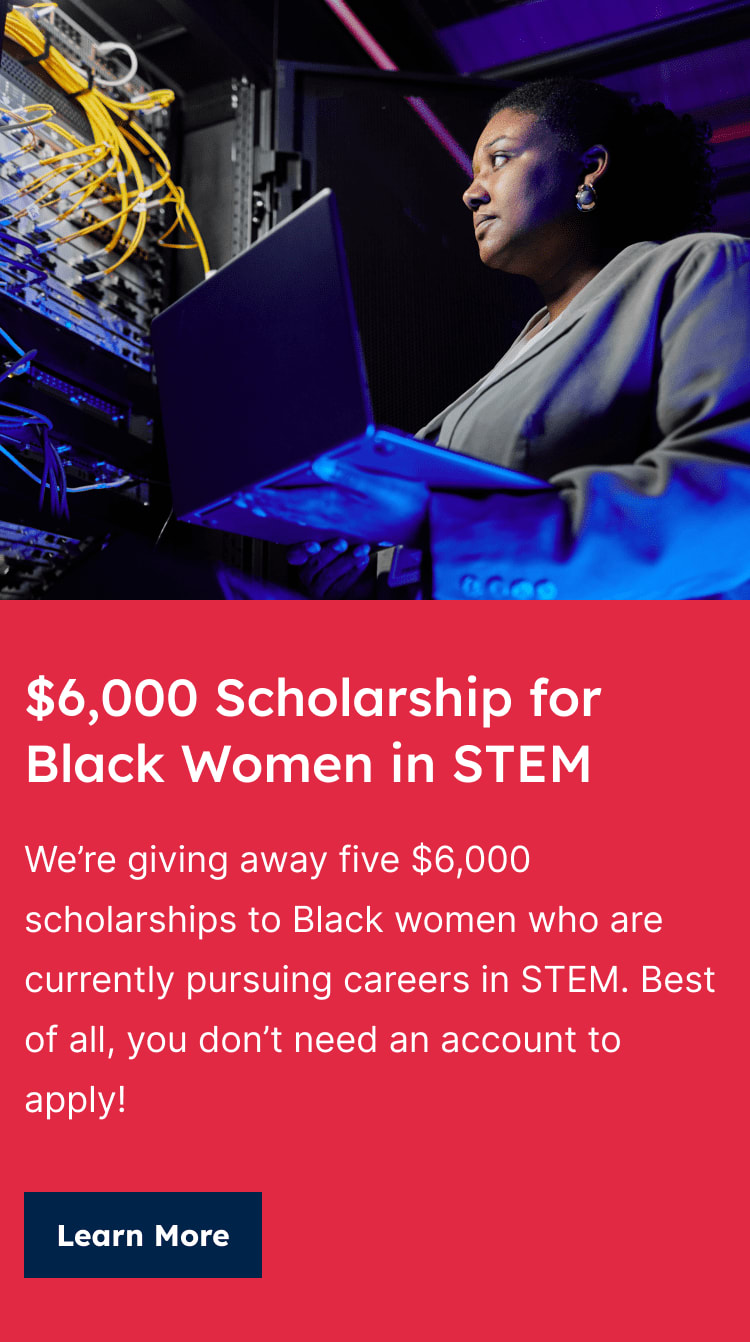2023 Scholarships for HBCU Students
Writer
Editor & Writer
Writer
Editor & Writer
For students attending historically Black colleges and universities (HBCUs), scholarships, internships, and fellowships can make higher education more affordable. HBCU scholarships and grants can supplement federal financial aid to help students fund their degrees and, ultimately, launch their careers.
While the majority of college students need financial aid to afford college, HBCU scholarships recognize the merit and potential of Black students with unique financial considerations.
Financial Considerations for HBCU Students
Pursuing a college degree is a costly proposition for most students, but it can be disproportionately expensive for Black students. Many Black students at HBCUs face hardships beyond those of their white peers, including increased student debt and less available institutional aid.
HBCU students receive $3,000 less in institutional aid than non-HBCU students, on average, and take out federal loans at twice the rate of non-HBCU students, according to the Center for Responsible Lending. As a result, many Black students face significant student loan debt.
HBCU scholarships and grants, which typically do not require repayment, can help alleviate these critical deficiencies in federal financial aid for Black students. The following sections describe some of the most generous and inclusive HBCU scholarships and grants.

HBCU Scholarships
Many HBCUs offer partial and full scholarships to enrolled students. Scholarships may be awarded based on a variety of factors, including merit and financial need. Students should inquire about these institutional scholarships when applying to college to alleviate their financial responsibility. Additionally, local chapters of Black fraternities and sororities, alumni chapters, and other organizations offer scholarships for HBCU students.
UNCF K-12 Education Fellowship
Who Is Eligible? Applicants must be undergraduate juniors at a qualifying HBCU. Students should be willing to relocate for a 10-week summer fellowship, which includes a paid internship within a K-12 organization or school. All majors are welcome to apply.
Application Deadline: January 23, 2024
Scholarship Amount: Varies
The ABOUT LOVE Scholarship
Who Is Eligible? Beyoncé's ABOUT LOVE Scholarship supports students at five HBCUs. Lincoln State University in Pennsylvania, Norfolk State University in Virginia, Bennett College in North Carolina, the University of Arkansas at Pine Bluff, and Central State University in Ohio. Students must pursue majors in creative fields and have a GPA of at least 2.0 to be eligible. Applications are listed by each institution.
Application Deadline: TBA
Scholarship Amount: Varies
Napier Park Scholarship
Who is Eligible? This scholarship suits Black students attending college in New York, New Jersey, or Connecticut. Students must be entering their junior year of undergraduate studies in a business-related major such as finance, math, economics, or computer science, aspiring to a career in investment management. Applicants require a minimum GPA of 3.0 and financial need.
Application Deadline: September 7, 2023
Scholarship Amount: Up to $5,000
Ralph Lauren Corporate Foundation Scholarship
Who is Eligible?: Applicants must be full-time students in their junior or senior year at a qualifying HBCU, with a minimum GPA of 2.75. Students may hold U.S. or international citizenship.
Application Deadline: September 28, 2023
Scholarship Amount: $5,000
Procter & Gamble BE U Scholarship Program
Who is Eligible? In partnership with Family Dollar and UNCF, Procter & Gamble awards the BE U scholarship to Black students attending a qualifying four-year HBCU in the District of Columbia, North Carolina, or Virginia. Applicants must be U.S. citizens, or national or permanent residents, with a minimum GPA of 2.5.
Application Deadline: October 2, 2023
Scholarship Amount: $1,500
UNCF-Getty Images HBCU Scholarship
Who is Eligible? This renewable scholarship goes to full-time, junior-level students in a qualifying major at any accredited HBCU. Recipients who meet eligibility requirements can potentially receive up to $5,000 in both their junior and senior years. Applicants must demonstrate unmet financial need, hold a GPA of at least 2.75, and file the FAFSA each year. Priority goes to first-generation college students.
Application Deadline: October 2, 2023
Scholarship Amount: Up to $10,000
UNCF Healthcare Workforce Diversity Program
Who is Eligible?: Applicants must be Black undergraduate students working toward a two-year associate degree or certification program in a healthcare-related STEM field. Candidates must hold U.S. citizenship or U.S. national or permanent resident status.
Application Deadline: November 6, 2023
Scholarship Amount: Up to $5,000
Grants for HBCU Students
Like scholarships, grants are "gifts" awarded to students who meet certain qualifications and do not need to be repaid, though some grants include service agreements. Grants for HBCU students can help alleviate some of the student loan debt that disproportionately affects Black college graduates. The following are among the most popular federal grant opportunities.
Federal Pell Grant
Who Is Eligible? Applicants must be undergraduate students who have not previously earned bachelor's, master's, or professional degrees. They need to submit the FAFSA to demonstrate financial need.
Application Deadline: June 30 (FAFSA deadline)
Scholarship Amount: Up to $7,395 (for the 2023-2024 award year)
Federal Supplemental Educational Opportunity Grant
Who Is Eligible? Eligible students, as determined by the FAFSA, include undergraduates who have not previously earned bachelor's degrees. Priority is given to students with exceptional financial need.
Application Deadline: June 30 (FAFSA deadline)
Scholarship Amount: $100-$4,000 per year
HBCU Tuition and Travel Grant
Who Is Eligible? Applicants must attend an HBCU that belongs to the IES Abroad consortium and apply to an IES Abroad program.
Application Deadline: Varies
Scholarship Amount: $2,000
Iraq and Afghanistan Service Grant
Who Is Eligible? Eligible students do not qualify for a Federal Pell Grant based on their expected family contribution but meet all other criteria. Applicants must also have been younger than 24 or enrolled in college at least part time when their parent or guardian died as a result of military service in Iraq or Afghanistan after 9/11.
Application Deadline: September 29, 2023
Scholarship Amount: Up to $7,395
Teacher Education Assistance for College and Higher Education Grant
Who Is Eligible? Applicants must meet the general criteria for federal student aid programs and be enrolled in a TEACH Grant-eligible program. Enrollees must score above the 75th percentile on one or more portions of a college admissions test or maintain a minimum GPA of 3.25. Awardees must also agree to complete a teaching-service obligation after graduation.
Application Deadline: June 30 (FAFSA deadline)
Scholarship Amount: Up to $4,000 per year
Additional Resources for Financial Assistance
Students can access a variety of tools to help apply for and manage multiple forms of financial aid, including internships, work-study, and career preparation programs at an HBCU.
Common Black College Application
CBCA walks students through completing The Common Application, which allows students to apply to multiple colleges and universities at once. For a single $20 fee, students can submit their application to all 65 CBCA-member institutions, including HBCUs.
HBCU First
Among the nation's leading internship programs for HBCU students, HBCU First provides career-centered experiences for Black youth. Internships include a variety of programs focused on leadership, mentoring, HBCU equity, career exploration, and STEM.
Thurgood Marshall College Fund
TMCF partners with major national corporations and esteemed HBCUs to provide resources for Black students, including scholarships and talent acquisition and career placement services.
HBCU Lifestyle
This resource caters to current HBCU students, HBCU alumni, and their parents. The portal offers services like HBCU rankings, job listings, and career development assistance. HBCU Lifestyle> also connects students with scholarships and college tours.
UNCF Empower Me Tour
United Negro College Fund hosts a variety of free, virtual events throughout the year to promote college- and career-readiness among Black high school and college students. UNCF also offers multiple merit scholarships to students attending the events.
Frequently Asked Questions About Scholarships for HBCU Students
Do HBCUs offer free tuition?
Some HBCUs may offer "free" tuition in the form of a full scholarship for qualifying students. Others may offer deep discounts, such as universal in-state tuition rates or tuition waivers for students who meet certain criteria, which can be combined with scholarships and grants to cover the majority of tuition fees and education expenses.
What is the cheapest HBCU?
University of the District of Columbia in Washington, D.C., is among the most affordable HBCUs. The cost of attendance is around $9,000 per year for in-state students and around $18,000 for out-of-state learners. Even many of the most expensive HBCUs keep costs lower than the national average for tuition.
What percentage of HBCU students receive financial aid?
According to TMCF, more than 75% of students at HBCUs receive Federal Pell Grants and nearly 13% pursue PLUS Loans to attend college. Outside of federal financial aid, many HBCU scholarships are distributed based on available institutional funding, which pales in comparison to that of primarily white institutions. On average, HBCU's endowments are roughly 13% of the size of non-HBCU institutions' endowments.
Which HBCU has the highest tuition?
Atlanta's Spelman College tops the list of the most expensive HBCUs in the U.S., with tuition exceeding $30,000 annually for students during the 2023-2024 academic year.
Which HBCU gives the most scholarships?
While exact scholarship numbers vary each year, Cheyney University of Pennsylvania awarded the most HBCU scholarships during the 2016-2017 academic year — according to HBCU Lifestyle — totaling more than $6,750 per student. Many other schools, including South Carolina State University, Delaware State University, Tuskegee University, and Virginia State University, also award generous scholarship packages to students.






